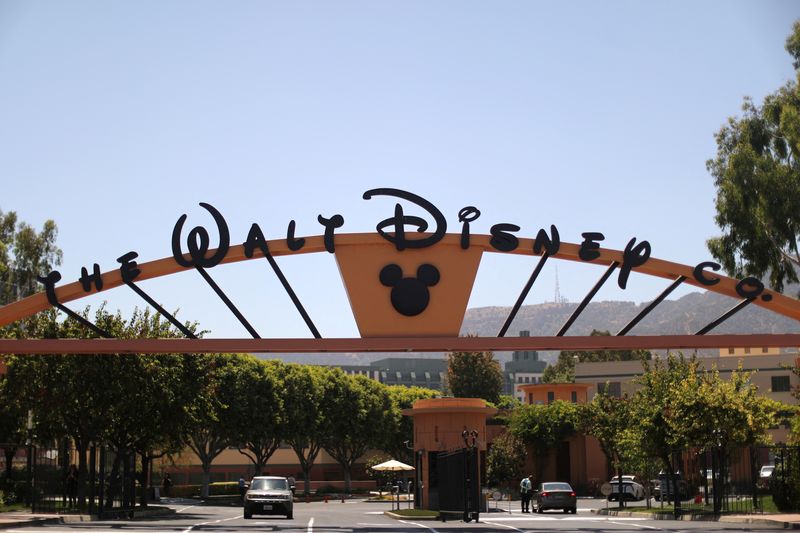By Dawn Chmielewski and Lisa Richwine
LOS ANGELES (Reuters) -Walt Disney predicted a 'moderation in demand' at its theme park business in coming quarters, overshadowing the success of the animated Pixar film "Inside Out 2" and the company's television business.
The company's stock was down 1.1% Wednesday as Disney warned operating income at the parks would be down 'mid single-digits' in the fiscal fourth quarter.
"We expect to see a flattish revenue number in Q4 coming out of the parks," Chief Financial Officer Hugh Johnston told investors, adding, "It's really just a few quarters. I don't think I would refer to it as protracted."
Analysts said weakness at Disney's parks, coming a time when consumer spending has been pinched by inflation, underscores worries about the slowing U.S. economy.
"Coupled with other travel companies recognizing poor growth, it is clear people are scaling back their spend when it comes to tourism and recreation," said Ben Barringer, technology and media analyst at Quilter Cheviot.
Disney's experiences segment that includes parks and consumer products - and makes up just over half of profit - recorded an operating income drop of 3%.
Operating income nearly tripled at its Entertainment unit, with the combined streaming businesses of Disney+, Hulu and ESPN+ posting a profit for the first time.
"Disney was ahead of schedule in delivering profitability in its streaming unit, which is a major milestone considering how much money the company has lost over the past several years while building up this operation, and how much its competitors have also lost," said Emarketer analyst Paul Verna. "If Disney can continue to deliver profitability quarter after quarter, it will have cracked the code."
Operating income for the unit is likely to fall by "mid single digits" in the July-September quarter compared with the same period a year prior, Disney said.
Adjusted earnings-per-share reached $1.39 for Disney's fiscal third quarter, topping analyst estimates of $1.19, LSEG data showed. Revenue rose 4% to $23.2 billion, beating forecasts of $23.1 billion.
Chief Executive Bob Iger told investors the company's streaming business is driven by the creative success of its entertainment division, with Disney's television group collecting a total 183 Emmy nominations. The box office success of films like "Inside Out 2" also prompted a surge in viewing of the original film on Disney+.
"We're seeing growth in consumption, on top of the popularity of our offering," Iger said. "Which gives us the pricing leverage that we believe we have. So every time we've taken a price increase, we've got a modest turn from that."
Iger is working to rebuild Disney after billions of dollars in losses from streaming efforts, the decline of traditional television and a rough patch for its storied film studio.
The movie studio is showing signs of resurgence.
"Inside Out 2" notched $1.6 billion in global ticket sales and "Deadpool & Wolverine," which debuted in the current quarter, has brought in more than $850 million.
"After several years of misfires and muted successes, Disney has now in the span of a month and a half released the highest grossing animated film of all time and achieved the largest ever opening for an R-Rated film," MoffettNathanson media analyst Robert Fishman wrote ahead of Disney's earnings release.
While it remains to be seen whether those successes represent a return to form, Fishman said, the upcoming film slate is "filled with highly dependable" titles including "Moana 2" and Oscar-winning director Barry Jenkins' "Mufasa: The Lion King."
The Entertainment division, which includes the film, television and streaming businesses, reported operating income of $1.2 billion in the quarter.
The Disney+, Hulu and ESPN+ streaming services produced operating profit of $47 million.
At the Sports unit, which includes the ESPN network and Star India business, operating income reached $802 million, a 6% decline from the previous year as costs to air cricket matches increased.

The experiences unit reported operating income of $2.2 billion. Disney said there was a "moderation" in demand at its domestic parks, whose operating income were also impacted by higher costs, increased spending on technology and new consumer offerings. It saw increases in attendance and higher spending at its international parks, where it also reported an increase in cost associated with new offerings.
The coming quarter will be affected by the Olympics, which depressed attendance at Disneyland Paris, and some "softening" of business in China.